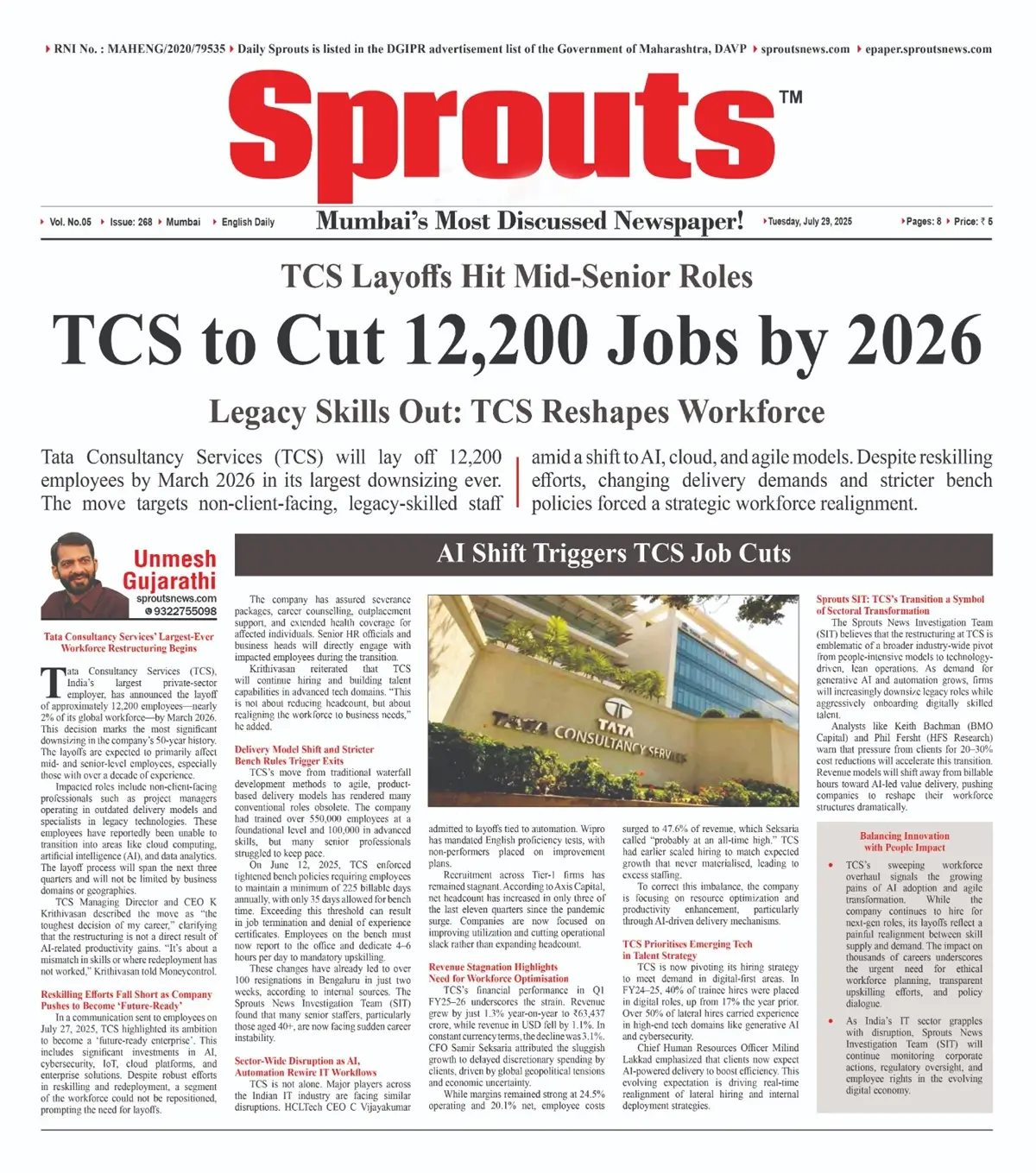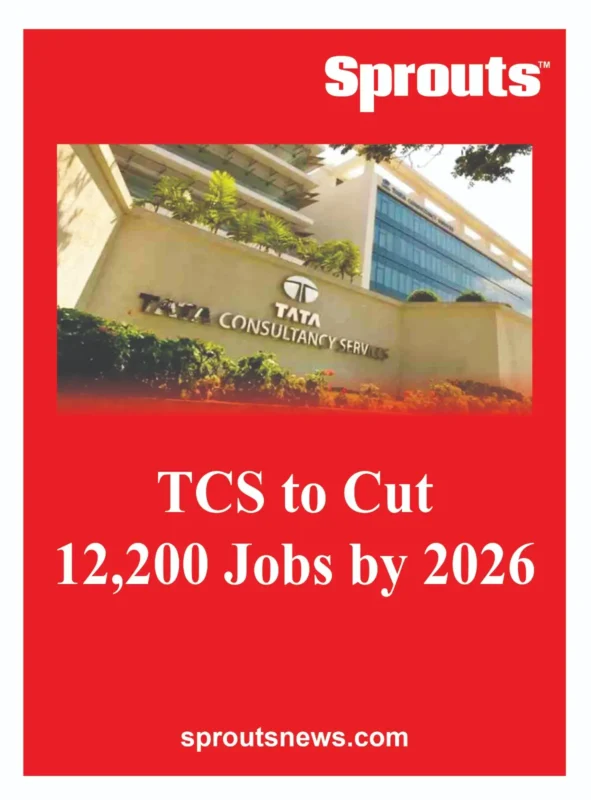TCS to Cut 12,200 Jobs by 2026
• TCS Layoffs Hit Mid-Senior Roles
• Legacy Skills Out: TCS Reshapes Workforce
• AI Shift Triggers TCS Job Cuts
Unmesh Gujarathi
Sprouts News Exclusive
Contact: +91 9322755098
- TCS to Cut 12,200 Jobs by 2026
- • TCS Layoffs Hit Mid-Senior Roles
- • Legacy Skills Out: TCS Reshapes Workforce
- • AI Shift Triggers TCS Job Cuts
- TCS (Tata Consultancy Services) Largest-Ever Workforce Restructuring Begins
- Click Here To Download the News Attachment
- Reskilling Efforts Fall Short as Company Pushes to Become ‘Future-Ready’
- Delivery Model Shift and Stricter Bench Rules Trigger Exits
- Sector-Wide Disruption as AI, Automation Rewire IT Workflows
- Revenue Stagnation Highlights Need for Workforce Optimisation
- TCS Prioritises Emerging Tech in Talent Strategy
- Also Read: PMLA Action Begins: Karnala Bank Asset Auction to Repay Depositors.
- Sprouts SIT: TCS’s Transition a Symbol of Sectoral Transformation
Tata Consultancy Services (TCS) will lay off 12,200 employees by March 2026 in its largest downsizing ever. The move targets non-client-facing, legacy-skilled staff amid a shift to AI, cloud and agile models. Despite reskilling efforts, changing delivery demands and stricter bench policies forced a strategic workforce realignment.
TCS (Tata Consultancy Services) Largest-Ever Workforce Restructuring Begins
Tata Consultancy Services (TCS), India’s largest private-sector employer, has announced the layoff of approximately 12,200 employees—nearly 2% of its global workforce—by March 2026. This decision marks the most significant downsizing in the company’s 50-year history. The layoffs are expected to primarily affect mid- and senior-level employees, especially those with over a decade of experience.
Impacted roles include non-client-facing professionals such as project managers operating in outdated delivery models and specialists in legacy technologies. These employees have reportedly been unable to transition into areas like cloud computing, artificial intelligence (AI), and data analytics. The layoff process will span the next three quarters and will not be limited by business domains or geographies.
TCS Managing Director and CEO K Krithivasan described the move as “the toughest decision of my career,” clarifying that the restructuring is not a direct result of AI-related productivity gains. “It’s about a mismatch in skills or where redeployment has not worked,” Krithivasan told Moneycontrol.
Click Here To Download the News Attachment
Reskilling Efforts Fall Short as Company Pushes to Become ‘Future-Ready’
In a communication sent to employees on July 27, 2025, TCS highlighted its ambition to become a ‘future-ready enterprise’. This includes significant investments in AI, cybersecurity, IoT, cloud platforms, and enterprise solutions. Despite robust efforts in reskilling and redeployment, a segment of the workforce could not be repositioned, prompting the need for layoffs.
The company has assured severance packages, career counselling, outplacement support, and extended health coverage for affected individuals. Senior HR officials and business heads will directly engage with impacted employees during the transition.
Krithivasan reiterated that TCS will continue hiring and building talent capabilities in advanced tech domains. “This is not about reducing headcount, but about realigning the workforce to business needs,” he added.
Delivery Model Shift and Stricter Bench Rules Trigger Exits
TCS’s move from traditional waterfall development methods to agile, product-based delivery models has rendered many conventional roles obsolete. The company had trained over 550,000 employees at a foundational level and 100,000 in advanced skills, but many senior professionals struggled to keep pace.
On June 12, 2025, TCS enforced tightened bench policies requiring employees to maintain a minimum of 225 billable days annually, with only 35 days allowed for bench time. Exceeding this threshold can result in job termination and denial of experience certificates. Employees on the bench must now report to the office and dedicate 4–6 hours per day to mandatory upskilling.
These changes have already led to over 100 resignations in Bengaluru in just two weeks, according to internal sources. The Sprouts News Investigation Team (SIT) found that many senior staffers, particularly those aged 40+, are now facing sudden career instability.
Sector-Wide Disruption as AI, Automation Rewire IT Workflows
TCS is not alone. Major players across the Indian IT industry are facing similar disruptions. HCLTech CEO C Vijayakumar admitted to layoffs tied to automation. Wipro has mandated English proficiency tests, with non-performers placed on improvement plans.
Recruitment across Tier-1 firms has remained stagnant. According to Axis Capital, net headcount has increased in only three of the last eleven quarters since the pandemic surge. Companies are now focused on improving utilization and cutting operational slack rather than expanding headcount.
Revenue Stagnation Highlights Need for Workforce Optimisation
TCS’s financial performance in Q1 FY25–26 underscores the strain. Revenue grew by just 1.3% year-on-year to ₹63,437 crore, while revenue in USD fell by 1.1%. In constant currency terms, the decline was 3.1%. CFO Samir Seksaria attributed the sluggish growth to delayed discretionary spending by clients, driven by global geopolitical tensions and economic uncertainty.
While margins remained strong at 24.5% operating and 20.1% net, employee costs surged to 47.6% of revenue, which Seksaria called “probably at an all-time high.” TCS had earlier scaled hiring to match expected growth that never materialised, leading to excess staffing.
To correct this imbalance, the company is focusing on resource optimization and productivity enhancement, particularly through AI-driven delivery mechanisms.
TCS Prioritises Emerging Tech in Talent Strategy
TCS is now pivoting its hiring strategy to meet demand in digital-first areas. In FY24–25, 40% of trainee hires were placed in digital roles, up from 17% the year prior. Over 50% of lateral hires carried experience in high-end tech domains like generative AI and cybersecurity.
Chief Human Resources Officer Milind Lakkad emphasized that clients now expect AI-powered delivery to boost efficiency. This evolving expectation is driving real-time realignment of lateral hiring and internal deployment strategies.
Also Read: PMLA Action Begins: Karnala Bank Asset Auction to Repay Depositors.
Sprouts SIT: TCS’s Transition a Symbol of Sectoral Transformation
The Sprouts News Investigation Team (SIT) believes that the restructuring at TCS is emblematic of a broader industry-wide pivot from people-intensive models to technology-driven, lean operations. As demand for generative AI and automation grows, firms will increasingly downsize legacy roles while aggressively onboarding digitally skilled talent.
Analysts like Keith Bachman (BMO Capital) and Phil Fersht (HFS Research) warn that pressure from clients for 20–30% cost reductions will accelerate this transition. Revenue models will shift away from billable hours toward AI-led value delivery, pushing companies to reshape their workforce structures dramatically.
Balancing Innovation with People Impact
TCS’s sweeping workforce overhaul signals the growing pains of AI adoption and agile transformation. While the company continues to hire for next-gen roles, its layoffs reflect a painful realignment between skill supply and demand. The impact on thousands of careers underscores the urgent need for ethical workforce planning, transparent upskilling efforts, and policy dialogue.
As India’s IT sector grapples with disruption, Sprouts News Investigation Team (SIT) will continue monitoring corporate actions, regulatory oversight, and employee rights in the evolving digital economy.




















Right here is the perfect site for everyone who wishes
to find out about this topic. You realize so much its almost hard to
argue with you (not that I personally will need to…HaHa).
You certainly put a brand new spin on a subject that has been discussed forr a long time.
Excellent stuff, just excellent!